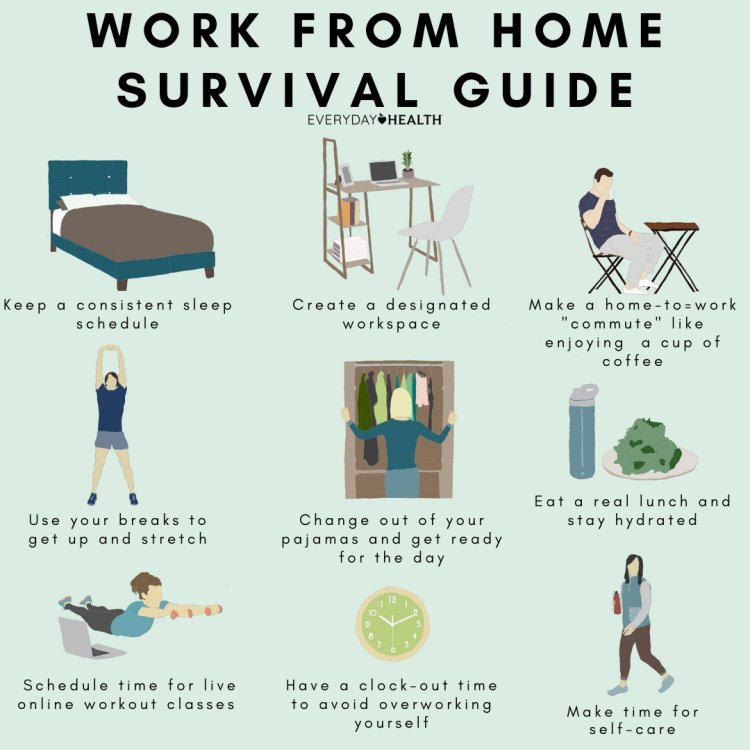Your Work-From-Home Survival Guide for Self-Care

Has the coronavirus pandemic made you a remote worker? These 11 tips can help you stay productive, happy, and healthy.
Transitioning from an office to working at home is challenging even in normal circumstances. Throw in a pandemic, closed schools, no gym time, new work procedures, zero social events, and plenty of time with your housemates? That's a recipe for overwhelm.
That's why self-care isn't a luxury, but an essential part of adjusting to a new normal. Here are some tips on how to work from home happily and productively — and without dialing up your stre
1. Keep a Consistent Sleep Schedule
Don't have a conference call until midmorning? Get up on time anyway. Is your Netflix binge in full force by the end of the day? Turn it off and get to bed at a decent time.
"When you're suddenly at home more, sleep schedules can take a hit as you try and adjust," says W. Christopher Winter, MD, the president of Charlottesville Neurology and Sleep Medicine in North Carolina and author of The Sleep Solution. "But sticking to the same wake time and bedtime are crucial aspects of self-care, because those contribute to sleep quality. Without that, you may find yourself groggy throughout the day, or with big fluctuations in energy."
When that happens, the temptation might be to take a long nap when you don't have work in the afternoon. But it's much more productive to get outside and go for a brisk walk instead, Winter says. If you do want a snooze, aim for a 20-minute power nap, and set an alarm for it, he suggests
2. Put Some Pants On (Yoga Pants Count)
Also, take a shower, comb your hair, maybe even put shoes on, suggests Christine Carter, PhD, a sociologist and senior fellow of the Greater Good Science Center at the University of California in Berkeley. Although there's a perception that working from home is a daylong pajama fest, the simple act of getting ready is a vital part of self-care and can help you transition into work easier, she says.
"You don't need to be in a full work outfit; you can still keep it casual. That's one of the nice things about working from home," she says. "But prepping for your day is a signal to your brain that it's not a weekend, and you're not sick. That will get your mind ready for the workday."
3. Create a Home-to-Work ‘Commute’
In the same way that getting showered and dressed is a message to your brain, so is having a home-to-work commute, says the Asheville, North Carolina–based productivity expert Tonya Dalton, author of The Joy of Missing Out: Live More by Doing Less.
The best part is that now your commute gets to be whatever you want it to be.
"Sit outside with your morning coffee, listen to the birds," she suggests. "Maybe take a walk, or read a chapter of a book, or do some yoga. Whatever it is, think of it as your transition time into working, the same as a commute would be."
4. Carve Out a Designated Workspace
While it's true that your "office" is your laptop, it's very helpful to have a space that you assign as your work area, even if that means a corner of the kitchen table, says Dr. Carter. Much like the "get dressed" and "have a commute" tips, this is another bit of self-care related to assisting your brain to get prepped for work.
Also, sitting in a real chair — we love you, couch, but you're so slouchy — does wonders for your attention, energy, and even your sense of confidence, adds Sharon McDowell-Larsen, PhD, an exercise physiologist and coach at the Center for Creative Leadership. There are even devices and apps for improving your posture, like Upright Pose and Posture Reminder.
Want to boost those feelings of motivation even more? Keep your space tidy.
"You don't need to scrub it down, but there is a certain feeling that comes with having an organized, designated space for working," she says. "That gives you a sense of caring for yourself, and by extension, caring about your work."
5. Build Breaks Into Your Schedule
Don’t make a daunting to-do list that threatens to send your stress levels soaring, but have a general grasp of what you'd like to accomplish today and when you'll tackle those projects, as well as when you'll take breaks, says Dr. McDowell-Larsen.
"Being as intentional as possible is very helpful when you're working from home," she says. "That might mean working on a different schedule than you had in the office. That might mean you have to schedule breaks at specific times. Play around with it so you're building your day in a thoughtful way from the start."
Do best with an app? You're in luck, because there are plenty that can help remind you to stand up and stretch. Experiment with options like Stand Up, BreakTime, and Time Out.
How are you practicing self-care during the pandemic?
6. Eat a Real Lunch (and Don’t Forget to Stay Hydrated)
Oh, the snacking. That's one surprise for many people when they first begin working from home — that perception of an endless and convenient buffet, and that can lead to grazing all day, says Dalton. Unfortunately, that doesn't usually mean healthy carrot sticks and hummus.
"The junk food and snacking issue looms large when you start working at home, especially if you're feeling stressed," she says. "Think of eating healthy lunches as another form of self-care, because that gives you the nourishment you need to have consistent energy."
If you're particularly challenged by this one, make your lunch in advance, just as you would have for the office. Or at least start the day knowing what you'll be putting together.
Also, stay hydrated in the same way, too, by filling up a water bottle and keeping it at your desk. You can keep track with an app like Hydro Coach or WaterMinder.
7. Set a Workout Time to Reset and Refresh
"It's already challenging enough to find work-life balance when you commute to an office, but when your home is your office, it's paramount to set boundaries and establish a routine," says the Scottsville, Arizona–based personal trainer Ramsey Bergeron. "With my clients who work from home, I've heard countless times that if they didn't have an appointment with me, they would have worked for another five hours that day."
Regular exercise provides numerous benefits — including increased immune function, according to a review published in May 2019 in the Journal of Sport and Health Science — and it helps you approach work with fresh perspective, Bergeron says. Even simply standing up and moving for a 15-minute break can lift your mood and help you process information better, he says.
"Personally, it helps me snap out of the midday funk," he adds. "It may sound counterintuitive, but if I'm feeling sluggish staring at my monitor, stepping away for a few minutes and being active actually energizes me."
8. Try Live Classes for Guided Sweat Sessions
Simply scheduling time to exercise is a form of self-care, but let's face it — you also have to follow through. Why not make it feel more social, especially in a time of isolation? There are scores of gyms and trainers who are now offering online programs and live classes. Check out options like Openfit, Obé fitness, DanceBody, and 305 Fitness.
"Psychologically, there's just something nourishing about feeling in community," says Carter. "Even if you're alone in your room, following along to an instructor who can't see you, knowing other people are doing the same gives a different feeling than doing a recorded class. It makes you feel part of a group."
If your work doesn't have an all-in component like video conference calls and Slack threads, live fitness classes could give you a sense of connection that helps you come back to work feeling more engaged and uplifted.
9. If Your Kids Are Home, Get Them Involved in Your Self-Care Regimen
If your children are home from school, it's possible you may be feeling overwhelmed by helping them navigate their schoolwork or stay entertained as you try to do work, says Dalton. When that happens, many people try to overfill the day and create too much structure. But there's a way all of you can be productive without getting cranky, and it requires involving your kids in setting self-care strategies, Dalton suggests.
"Ask them at the beginning of the day about what the breaks could be," she says. For example, she's set a "lunchtime reading hour" that the whole family does. They eat together, and then everyone reads quietly for half an hour before going back to work.
"Structure is everything when it comes to self-care and working from home," she says. "You can't be too strict and regimented about it, but you also need to show your kids the benefit of creating routine."
10. Have a Clock-Out Time to Avoid Overworking Yourself
Just as establishing a pre-work ritual in the morning is helpful, "commuting home" is also essential. That's when you close the work email, change into the sweatpants, and start looking through your pantry for dinner options.
"Again, this comes back to routine," says McDowell-Larsen. "It is very easy when you work from home to keep working into the evening, saying you'll just answer a work email or two, and then you get caught up. But that can lead to burnout over time."
To be as effective as possible at your job, know when to quit for the day.
11. Finally, Make an Appointment for You Time
When it comes to self-care, the perception is often one of indulgence: mud masks, long baths, goblets of wine, lounging in bed until noon. But as the strategies on this list highlight, self-care is actually making yourself a priority in an everyday way, especially when working from home.
It's about finding healthy ways to comfort yourself, set priorities, stay connected, and create structure. Especially now, when none of us knows what looms ahead, these things can give you a much-needed sense of control that translates to making working into a meaningful activity — not one more big stressor.
"Self-care is not selfish," says Carter. "Maybe this is a time to see working from home not as a hassle, but as an opportunity for taking care of ourselves. And through that, building a stronger foundation for ourselves, our families, and our communities."










